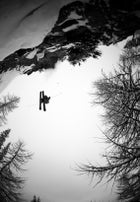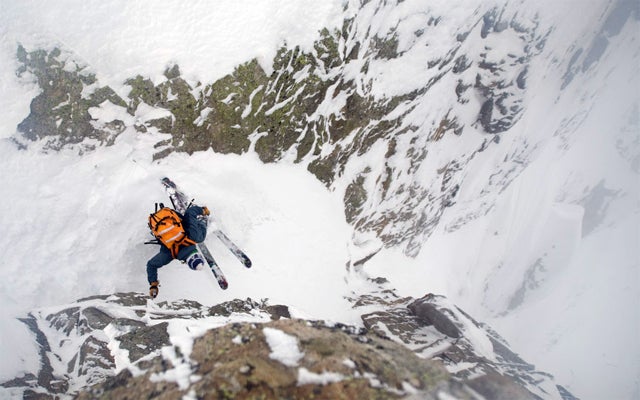Swedish ski-mountaineer Andreas Fransson, 29, blazed into the ski industry’s collective consciousness this year with the release of Mike Douglas’ documentary Tempting Fear. The film, which follows Fransson’s comeback from a near-fatal ski injury in 2010, won Best Action Film on October 5 at the in Boulder, Colorado.
The Snow Report
The latest snow, ski, and winter sports stories from �����ԹϺ���.
But for the past few years, Fransson has been steadily earning the respect of his peers by quietly notching eye-popping ski-mountaineering feats, including first descents in Norway’s Lyngen Alps last spring and Denali’s South Face in 2011. In early October, he returned from a month-long expedition to Patagonia, where he claimed the first ski descent of the Whillans Ramp on Argentina’s Poincenot.
When he’s not scouting obscure corners of the globe for new lines, Fransson lives in Chamonix, where he’s training to become a mountain guide. But what separates Fransson from many of his hard-charging peers, is his elegant outlook on life and skiing. He’s endlessly searching for new challenges, journeys, and meaning in it all. Here he discusses fear, risk, and adventure—the philosophic musings of a self-proclaimed soul skier.
In Tempting Fear you say: “It is a human condition to seek adventure and challenge. The temptation to test both possibilities and limits is strong in some.” What exactly do you mean?
I think it’s the human condition to be curious in life. Fear in different shapes keeps us away from exploring the possibilities of life experience. The only sane thing I can think of is to play with life. Play with fear. Play with existence. Play with love, sex, the mountains, and even death. Play is the value of everything. Boredom is the problem.
How does this notion of “tempting fear” play into your skiing?
Skiing is just one of many ways I express myself in life. It’s the thing I have done the most, so I’m not hindered by a lack of skill, which allows me to play with fear before, during, and after I do something. This makes the experience more complete.
What was the experience like of shooting Tempting Fear?
It was a very escapist experience, as I can’t completely identify myself with the Andreas in the movie. I feel like I change so fast and the film is all based on old thoughts, old actions, old adventures, and I don’t think much of what’s old and gone. I’m a new person. Now, I’ve got new theories, new thoughts, objectives and new adventures coming up. But in short, I had a great time, I learned a lot and I really appreciated spending time with Mike Douglas and Bjarne Salén, as well as the guys at Switchback and Salomon.
In the film, you talk about defying society’s expectations as the means to finding adventure. What do you see as society’s expectations and how do you defy them?
I have to challenge my own expectations to go beyond, into the unknown—the only place where real adventure can be found, as I see it. If you know the outcome of something, it will become dead. So we have to play with the unknown, in big and small things, to get freshness in our lives.
To defy society’s expectations might be to defy the concept others (friends, family, colleagues, media) put on us. In other words, to not live the story others create for us and instead, write the magic of our own lives.
How do you pick your trips and objectives? Can you talk about skiing the Whillans Ramp on Poincenot?
As a skier and person, I’m always looking for challenges and it’s not easy to find the perfect challenge, where the difficulties are so great that you can precisely overcome them and cash the rewards. In this way, Poincenot was the perfect challenge for me.
Why did you choose this region and these mountains for this expedition?
American alpinist Colin Haley pointed the ramp out to me years ago, and this autumn was the perfect time to go. It was a fun place to be because the mountains are wild and there has been very little steep skiing done there.
Given the risk—of injuring oneself, losing life, losing loved ones, the defeat and the setbacks—why do you do what you do?
This is what I dreamed of doing when I was a boy and now I’m here, living that dream. One of the reasons I think I can do this is because I don’t think the consequences behind the risks are as bad as society wants us to think they are.
In one of your recent blog posts, you try to define “value” in life. How do you define value in your life?
This can differ from day to day, but taken from the heart right now, this is what I value: Being able to play a game I love playing. The ability to share the game with people I love. Having as much freedom as possible, but at the same time remembering that you can never bake anything with the oven door open. Eat great food and drink good wine. See places from the inside and outside. Always remember that we are all playing a game.
Talk about having “to nourish both sides of the coin—the up craving and the will to run away.”
You have to have fear and one voice inside of you wanting to back off. At the same time, you need to have another voice telling you to continue. The “real you” stands in the middle and tries to make a sober and balanced decision. It’s the balance between the two that gives you success and completion of an objective, and at the same time keeps you alive.
Can you describe the accident in which you broke your neck?
Two years ago, I was skiing with Colin Haley down the Y couloir on Aiguille Verte in Chamonix. It’s a complicated descent and we tried to make it in a one-day push. The skiing took a bit longer than expected and the weather was much warmer than forecasted. On a rappel close to the end, I got caught in an avalanche that swept me 400 meters down ice, rock and snow. I was in pieces and very lucky to be alive, even more lucky to be able to have a body that can still perform. I learned a lot though from this and I think this experience has been one of the most rewarding experiences of my life.
How did this accident shift the way you view risk?
Every time I ski something steep, I get flashbacks from falling down the mountain. It helps keep me focused when I need to. And I’m extremely picky about objective dangers and stupid exposure to risk nowadays. I can still go out there and expose myself for a great objective, but I have no craving whatsoever to expose myself to risk when it does not equal the reward.
What’s your ultimate goal?
In skiing, I’d like to just mature as a skier—in decision-making, technique, tactics, strategy and so on. In life, I’d like to keep revealing the secrets that are in front of my eyes. Become more tender and compassionate. Take dreams down from the sky, juggle them for a while, and then let them sink down to the ground while I continue walking toward … I don’t know where.


